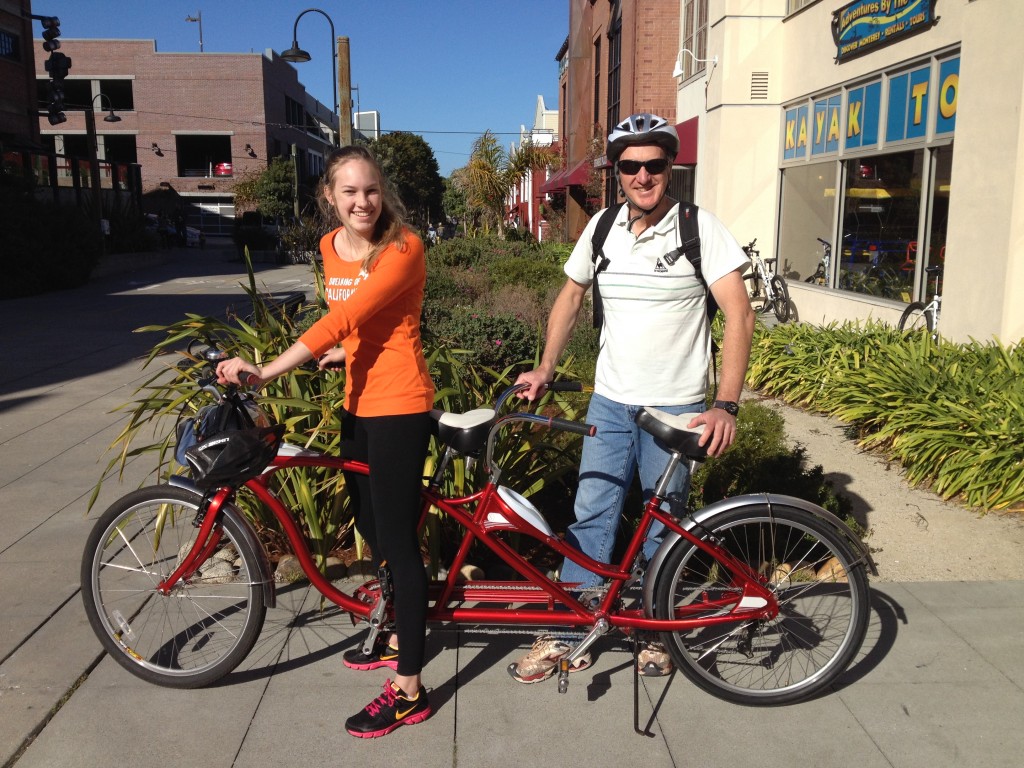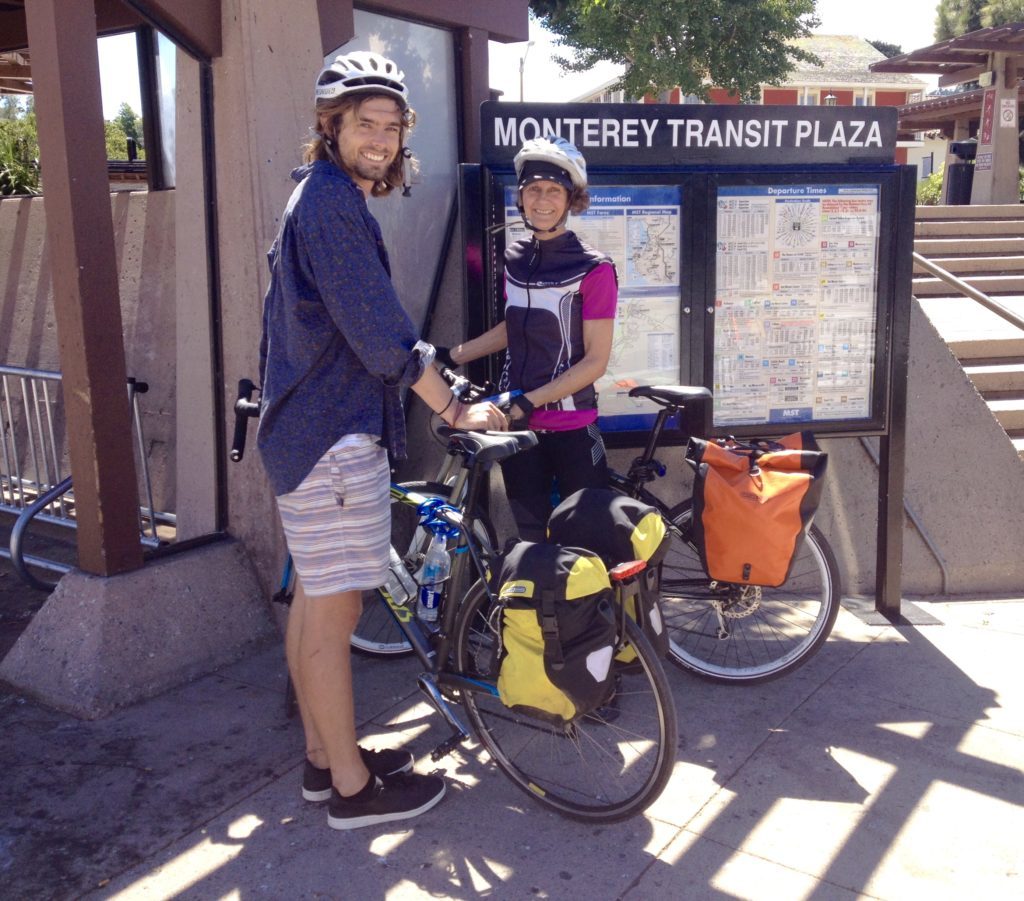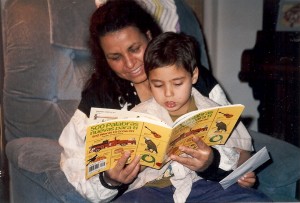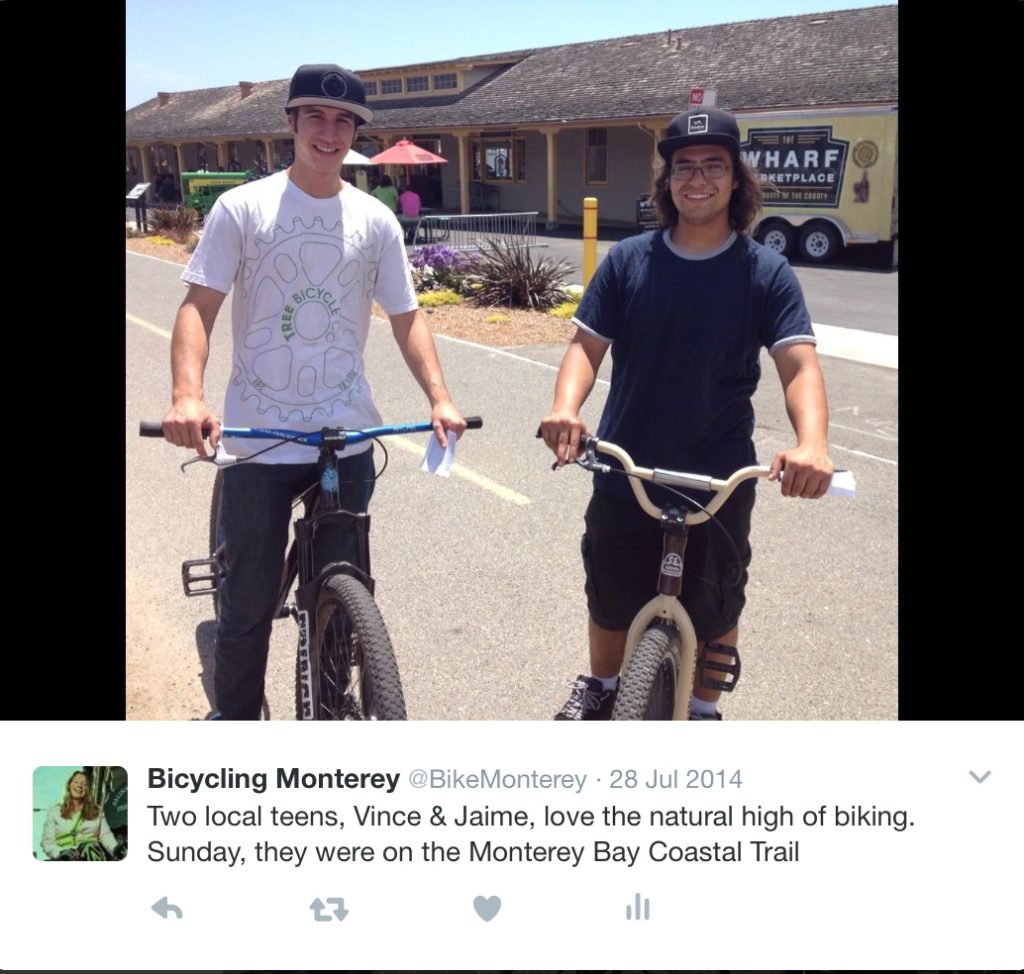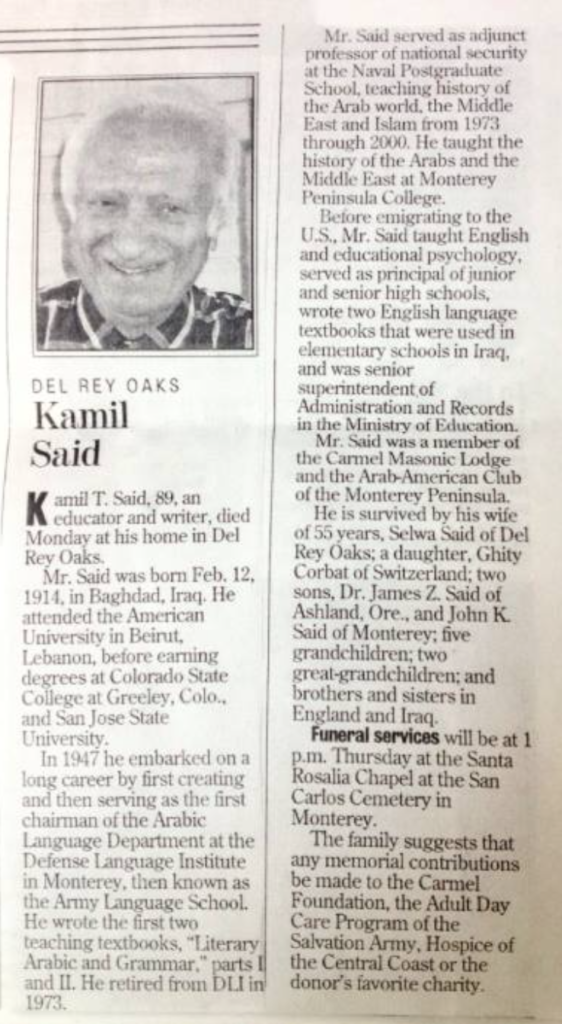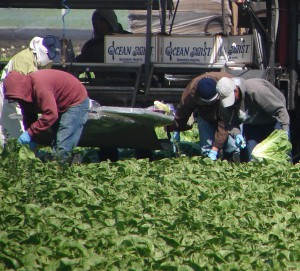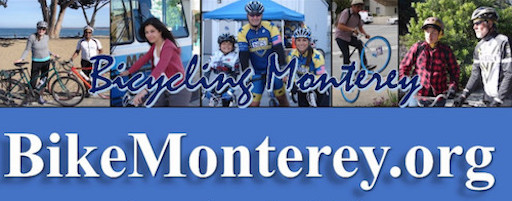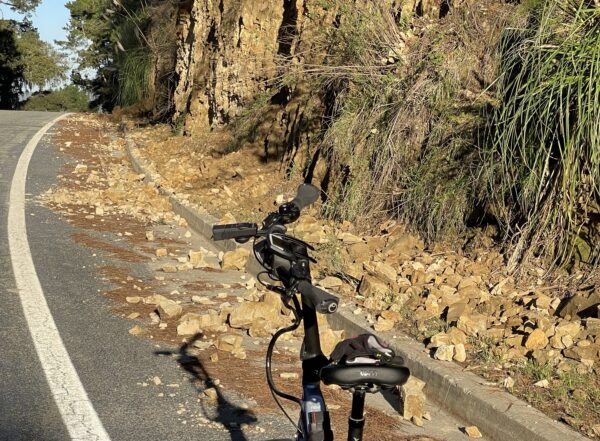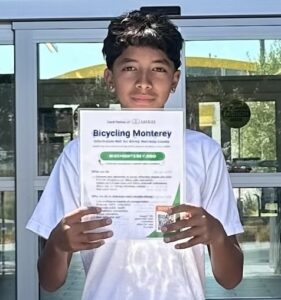Posted by Founder, Bicycling Monterey
Aussies, others ask: Immigration – What’s up with U.S. policies?
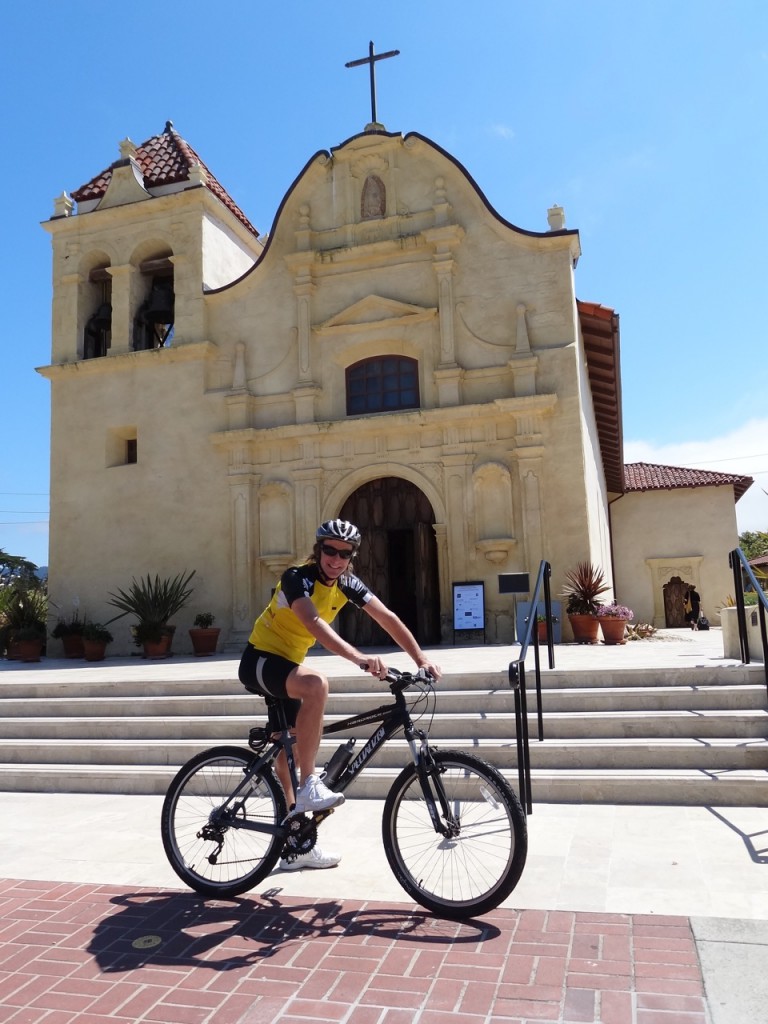 On the local, state, national, and international level, many of us in the United States are taking actions to express that we respect and appreciate the cultural richness of our country. The U.S. has long been affectionately referred to as a melting pot, a nation of immigrants.
On the local, state, national, and international level, many of us in the United States are taking actions to express that we respect and appreciate the cultural richness of our country. The U.S. has long been affectionately referred to as a melting pot, a nation of immigrants.
For much more about that, including what the Soledad City Council, Seaside City Council, Salinas City Council, Monterey County Board of Supervisors, and others—including law enforcement and school officials—have to say, scroll down.
Pictured above: Australian visitor Carey Beebe.
One of my greatest pleasures in biking Monterey County is making world community connections. Here I’ve met by bike people from Australia (see more below), China, Denmark, France, Germany, Holland, Italy, Mexico, Russia, and many other countries.
It’s a pleasure also to hear from Australians and others who visit the BikeMonterey.org website, even if they don’t visit Monterey County. Steve Matheson was among people who wrote to tell Bicycling Monterey: “I love the site! I’m a bicycling fan from Australia.”
Pictured below are some Australian visitors I’ve met while biking. The first photo was shot in a section of the Monterey Bay Sanctuary Scenic Trail—on Cannery Row. The second was at the Monterey-Salinas Transit (MST) downtown transit center in Simoneau Plaza.
A message to Australians, including Australian Prime Minister Malcolm Turnbull, Carmel Bach Festival’s bike commuting instrument technician Carey Beebe (pictured above), and all other Aussies: As Bicycling Monterey’s founder, I share Australia’s commitment—one shared by millions of U.S. citizens— to multiculturalism and a non-discriminatory immigration system. Writers Greg Miller and Philip Rucker reported February 2, 2017 in the Washington Post (“No ‘G’day, mate’: On call with Australian prime minister…”), there is a significant amount of tourism between Australia and the United States. And for me, Monterey County’s visitors from Australia and elsewhere add to the fun of meeting people on our bikeways. Welcome!
United States: A Nation of Immigrants
NOTE: Bicycling Monterey respects all who take time to educate themselves about local, state, national, and international issues, then take positive actions according to their own beliefs and conscience.
To my fellow Americans: Unless you are one of the indigenous people of Alaska, Hawaii, or the continental “lower 48” of the United States, if you are a U.S. citizen, you are an immigrant or the descendent of an immigrant.
A native of rural Central Illinois, I respect the Spanish and Mexican history of my adopted (since 1976) home state of California. In 1776 Spain named Monterey the capital of its Baja (lower) California and Alta (upper) California. In 1821 Mexico won its war for independence from Spain, and California subsequently pledged its allegiance to the Mexican government. In 1846 the Mexican-American War began, and not until the Treaty of Guadalupe Hidalgo was signed in 1848 did Alta California became part of the U.S. (Want a fun way to learn more? Bike to history.)
The U.S. Census Bureau reports that Monterey County is 57.8% Hispanic/Latino and that 30.1% of our county’s population was “foreign born.”
Photo below: Seaside Police Activities League (PAL) Bike Fair, May 2011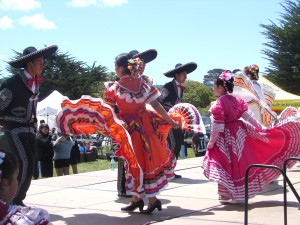
What about multiculturalism and non-discriminatory immigration systems?
The president of the United States had a phone conference with the Australian prime minister on January 28, 2017, the topic of a February 2, 2017 Washington Post article by Greg Miller and Philip Rucker referred to earlier (“No ‘G’day, mate’: On call with Australian prime minister…“). The Australian prime minister posted a message about the topic on Twitter on January 29.
Update: As reported by the Los Angeles Times and other media, on February 9, 2017, a panel of the U.S. 9th Circuit Court of Appeals ruled that a Seattle federal judge’s earlier restraining order on the new policy (1/27/17 POTUS executive order) should remain in effect while the judge further examines its legality.
Scroll below the next photos to see
what Monterey County officials
have to say on the subject.
Shared below are what the Monterey County Board of Supervisors as well as some local law enforcement officials, school officials, and others have said about the U.S. immigration system and its impact on Monterey County residents.
Many posts and pages of the Bicycling Monterey website, e.g., “Información en español sobre las bicicletas” and East Salinas / The Alisal, pay tribute to the fact our county is among the growing number of places in the U.S. with a “minority majority” population. Check out the Monterey County Weekly chart in Bicycling Monterey’s Spanish resources compilation to get an overview of Monterey County cities.
Like the Oklahomans who moved in the Dust Bowl of the 1930s from Oklahoma to Alisal (later incorporated as East Salinas) many Mexicans moved here to feed their families and create a better life. Salinas native Larry Hosford wrote in his song “Salinas”: “Where did the Okies go when the dust began to blow?… Send all the Okies and the Mexicans home, you’d soon have nothing to eat.” https://www.youtube.com/watch?v=eV_8cBkiybs
Learning other languages and cultures through friendships is commonplace in Monterey County.
That was the case for our family friend, Wendolyn, and my daughter, Sierra, pictured below.
One of my first Spanish teachers was my friend Isabel, shown below with her son, Jaime. Below that photo, see Jaime—now a young man—out biking the Monterey Bay Sanctuary Scenic Trail with his friend Vince.
Wondering just who is an undocumented immigrant? You may find of interest these answers to common questions about illegal immigration in the United States from Nolo Press.
[Update, 24 Nov 2017: “Judge sides with sanctuary cities, including Salinas and Monterey County, against Trump administration,” by Sara Rubin in the Monterey County Weekly, 11/24/17.]
City of Soledad Council
On March 21, 2017, the Soledad City Council, by a unanimous 5-0 vote, passed a resolution designating Soledad a Sanctuary City. Learn more on the City of Soledad website; click here. As noted in Sara Rubin’s 3/27/17 report in the Monterey County Weekly (“Soledad becomes a sanctuary city, Salinas and county sign on to support federal lawsuits“), Soledad is “the first in Monterey County to pass a sanctuary city resolution. ”
Soledad is home to many agricultural workers and is also a gateway to Pinnacles National Park.
City of Seaside Council
On March 29, 2017, the Seaside City Council, by a 4-1 vote, passed a resolution designating Seaside a Sanctuary City. Read David Schmalz’s 3/30/17 report in the Monterey County Weekly (“Seaside becomes the Monterey Peninsula’s first sanctuary city“).
City of Salinas Council
On February 7, 2017, “In the wake of President Trump’s executive order ban over immigration,” as Amy Wu reported in the Salinas Californian, “the city of Salinas passed an immigration resolution that affirms the city won’t discriminate against people based on national origin or immigration status.” Read Amy’s story for details.
On March 7, 2017, Salinas City Council voted 6-0 to file a lawsuit challenging the 1/27/17 executive order. Learn more in Amy Wu and Chelcey Adami’s 3/7/17 story in the Salinas Californian.
Hartnell College, Salinas
On February 7, 2017, Hartnell College Board of Trustees unanimously voted “in favor of a resolution that supports undocumented students.” Learn more in a report by Susan Vazquez in the Salinas Californian.
Congressional Representative Jimmy Panetta
On February 12, 2017, District 20 / Central Coast new Congressional Representative hosted a Town Hall at Hartnell College, Salinas. Read reports in the Monterey County Weekly by Sara Rubin, Monterey County Herald by Tom Leyde, and Salinas Californian by Amy Wu, along with other media coverage available online.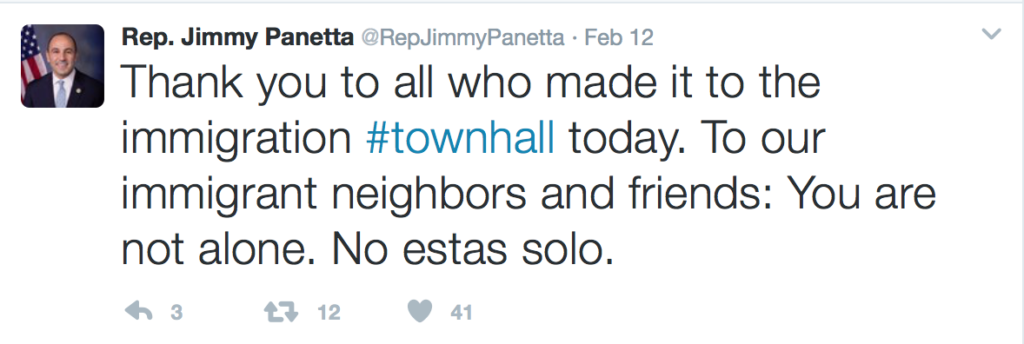
Monterey County Board of Supervisors
The Monterey County Board of Supervisors took action on January 31, 2017 to unanimously oppose the January 27 executive order by the U.S. President regarding immigration.
Supervisors Mary Adams, Luis Alejo, Jane Parker, and Simon Salinas voted 4-0 to denounce the Jan 27 POTUS order. Supervisor John Phillips was absent from the meeting but told Monterey Herald reporter Jim Johnson (“Monterey County Board of Supervisors denounce Trump travel ban order” January 31, 2017) that he was recovering from surgery and was in agreement with his fellow supervisors. Supervisor Phillips indicated he is “opposed to the Trump executive order.”
For more info, see David Schmalz’s January 30 story in the Monterey County Weekly, “County supervisors set to denounce Trump’s immigration order.”
On February 14, 2017, the Board again addressed this issue. This time, Supervisor Phillips dissented when the Board passed a resolution, 4-1, that declares Monterey County as “a welcoming county to immigrants and refugees.” Learn more in Amy Wu’s 2/14/17 story, “Monterey County supes OK immigration resolution, 4-1”
in the Salinas Californian. And see Amy Wu’s 3/24/17 story, “Phillips: Why I voted against sanctuary.”
Monterey County Law Enforcement Professionals
In “Our Approach to Policing” on the police department website for Salinas, the Monterey County seat and its largest city, it’s long been pointed out: “We don’t go after people because of their immigration status.”
At the February 12, 2017 Town Hall in Salinas with Congressional Representative Jimmy Panetta, as reported on Twitter by Sara Rubin, editor of the Monterey County Weekly, SPD Chief Adele Fresé affirmed: “Salinas Police Department has no part in immigration.”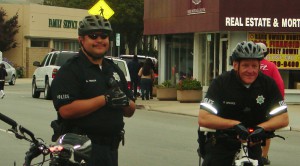
Monterey County Sheriff’s Office
For related information, see Bicycling Monterey’s 2/15/17 post, “ICE Advisory for People Who Bike – Immigrants and Law Enforcement in Monterey County.”
Sheriff Steve Bernal wrote, as published in the Salinas Californian on January 18, 2017 and in the Monterey Herald on January 17: “I want to assure every resident of the county, and that includes the approximately 13.5% of undocumented residents, that they can call the Sheriff’s Office in their time of need to report crimes, provide witness information, or simply seek any service we provide without fear of any deputy enforcing federal immigration law….I understand the enforcement of immigration law is the responsibility of the federal government and not local law enforcement.“
Certainly there is room for discussion and deeper understanding on this issue with regard to law enforcement. You may also be interested in what Undersheriff Michael Moore wrote in the November 28, 2016 Monterey Herald, “ICE policy a commitment to public safety,” along with a follow-up story January 12, 2017 by former Herald editor Royal Calkins, “Sheriff’s squad scrambles the records on potential deportees.” Questions? Contact the Sheriff’s Office (scroll down their contact page for various numbers).
Amy Wu’s 2/14/17 story, “Monterey County supes OK immigration resolution, 4-1” in the Salinas Californian includes references to the Sheriff’s Office, including comment from Sheriff Steve Bernal about that resolution.
Below, an article shared February 12, 2017 by Undersheriff Michael Moore of the Monterey County Sheriff’s Office.
Monterey County schools
On December 21, 2016, California State Superintendent of Public Instruction Tom Torlakson issued a letter, “PUBLIC SCHOOLS REMAIN SAFE HAVENS FOR CALIFORNIA’S STUDENTS.”
Salinas City Elementary School District’s Board of Education voted unanimously January 9, 2017 to designate all 14 schools as “Safe Havens” that protect students regardless of immigration status. http://www.salinascityesd.org/blog
Carmel Unified School District, Monterey Peninsula Unified School District, Pacific Grove Unified School District soon joined Salinas City Elementary School District in showing their respect and support for students, regardless of immigration status. A January 17, 2017 letter jointly issued by Carmel, Monterey, and Pacific Grove school districts stated, “We are committed to providing a high quality education for each student irrespective of their immigration status, ethnicity, race, religion, sexual orientation, ability, sex and gender identity, socio-economic status or beliefs….we want to communicate to our students and parents that they are welcome on our school campuses, and share with them that existing laws protect their privacy (e.g., student records) from inquiries from outside agencies, including questions about immigration status.”
Alisal Union School District declared themselves a Safe Haven School School District as of January 18, 2017, as reported in the Monterey County Weekly on January 26 by Marielle Aguezza, “Local school districts declare themselves ‘safe havens.’” Alisal also hosted a “Community Immigration Forum – A SAFE PLACE FOR YOU AND YOUR FAMILY – Get Informed, Prepare Yourself & Know Your Rights.”
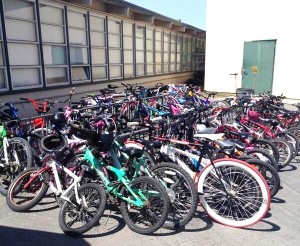
As my cousin Myranda Janet-Barb, an associate director of Community Integration Programs at World Relief, wrote on January 28, 2017:
“Even if you do not agree with refugee resettlement, or you question the current vetting process, if you care at all about our active military, pay attention to these changes [POTUS executive order of January 27, 2017]. Brave men and women who risked their lives in Iraq to help our troops are being turned away.”
Many Muslims, even U.S. citizens, feel increased fear of harassment due to religion or country of origin.
With regard to local Muslims, my friend Nashwan Hamza was among those making public comments at the January 31, 2017 Monterey County Board of Supervisors meeting.
I met Nashwan, a Muslim and president of the Arab American Club of Monterey, through a close mutual friend, Kamil Said. You may have read about Kamil’s widow, Selwa Said, on this site, in “Outstanding Women of Monterey County 2015.”
Nashwan also gave the eulogy at the memorial service for Kamil, a Muslim who gave my Christian daughter a grandfather’s love, and knowledge of Middle Eastern history too.
Read Kamil’s obituary below to learn how this Iraqi native served our nation at the Defense Language Institute (formerly the Army Language School) and at the Naval Postgraduate School, where he served as an adjunct professor of national security.
Agricultural laborers in the Salad Bowl of America
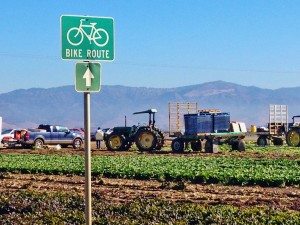 The vast majority of Salinas Valley field workers and other ag laborers are Latino/Hispanic, including documented and undocumented immigrants.
The vast majority of Salinas Valley field workers and other ag laborers are Latino/Hispanic, including documented and undocumented immigrants.
Many feel increased fear of harassment due to ethnicity—and for the undocumented, fear of deportation too. Ask a Salinas Valley grower about labor shortages and you’ll understand that these laborers are needed and appreciated here. They work hard. “These are jobs nobody else wants,” as Salinas Mayor Joe Gunter told Bloomberg back on August 14, 2013.
Ironically, many agricultural laborers are themselves not well-fed.
Learn more in Bicycling Monterey’s post “Salinas Valley, Salad Bowl of the Nation — Who could be hungry?”
You and your friends can let agricultural workers know that you appreciate their labor to help feed America. Here’s how:
Post a photo online with the hashtag #SalinasFeedsAmerica and/or #SalinasAlimentaNuestraNacion.
What sort of photo? Any that include one or more of the foods grown here. You might show yourself or your family or friends enjoying eating the food, or you could simply show the food alone.
The Salinas Valley is renowned as “Salad Bowl of America,” providing 61% of America’s leaf lettuce, and 56% of its head lettuce.
Other foods brought to America’s tables thanks to Salinas Valley ag workers: artichokes, Asian veggies, broccoli, brussels sprouts, carrots, cauliflower, celery, chard, kale, lettuce, peppers, potatoes, radicchio, spinach, strawberries, tomatoes, and much more.
For business owners
“Sara Boyns, Workplace Law: Responding to an unexpected ICE visit at my business” in the 3/2/17 Monterey Herald may be of interest to you if you are a business owner.
* * *
If you found information on the Bicycling Monterey website of value, or you appreciate other of the Bicycling Monterey projects, please make a contribution in any amount.
Thank you. Gracias.
* * *
Bicycling Monterey respects all who take time to educate themselves about local, state, national, and international issues, then take positive actions according to their own beliefs and conscience.
Want to make a comment? Kindly note Bicycling Monterey’s policy about making a comment.
This post was previously published February 2, 2017 with some subsequent updates.
For a related post on this site, see “East of Salinas” and Deferred Action for Childhood Arrivals / DACA Renewal Clinics in the Monterey Bay Region.
This post was published on 23 March 2017. One or more changes last made to this post on 22 February 2020.

